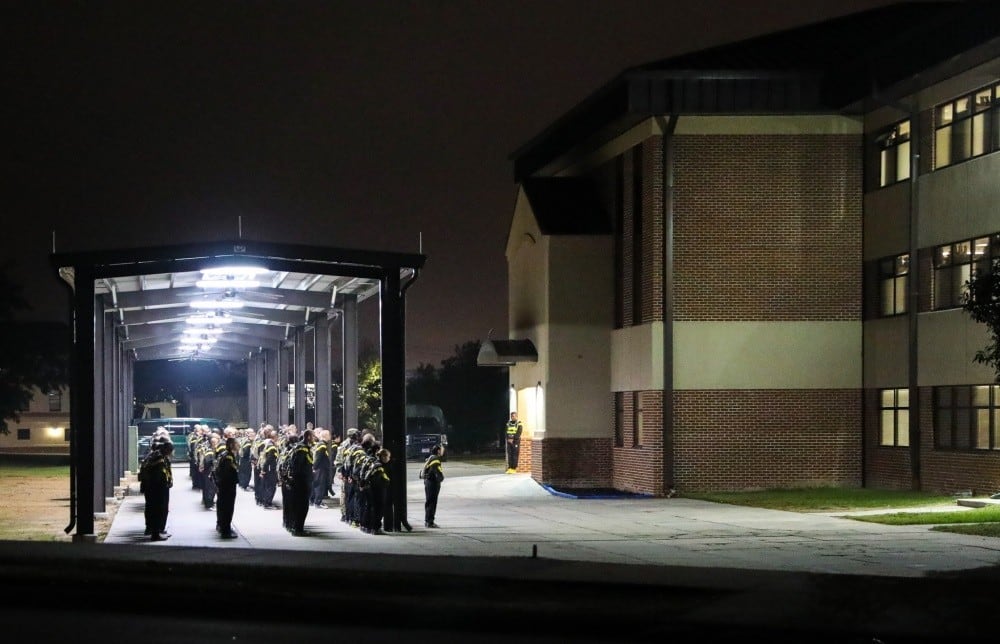In the days after Army trainee Jovan Collazo allegedly fled his Fort Jackson basic training unit and used an unloaded M4 carbine to hijack a school bus in South Carolina, his attorney has indicated his mental health may have played a factor.
Army recruiters with whom Army Times spoke say it’s not outside of the realm of possibility that Collazo slipped through a medical screening system that operates primarily on the honor of recruiters and their applicants.
Collazo wasn’t thinking “clearly and normally,” Fielding Pringle, the trainee’s defense attorney, told South Carolina’s The State newspaper Thursday after he allegedly tried to escape from jail.
Collazo was naked, handcuffed and on suicide watch at the time of the purported escape attempt.
“These are obviously not the actions of an individual who was thinking clearly or rationally with an intent to escape,” said Pringle in a statement provided to local media. “These are the actions of a very troubled young man.”
After commandeering the school bus, Collazo told the driver he didn’t want to hurt anyone and that he wanted to be taken to the next town, Army Times previously reported. He eventually let the children and bus driver out before driving away.
A few miles later, Collazo abandoned the rifle and the bus to search for clothes in a nearby neighborhood. Police then found him and he was arrested without incident.
No recorded issues
Officials from Army Recruiting Command say they were not aware of any potential mental health issues at the time of Collazo’s enlistment, and a subsequent review of his file hasn’t revealed anything new, either.
“When Jovan Collazo enlisted, he had no criminal or personal health records, or other indicators that he wasn’t fully qualified,” said Lisa Ferguson, a command spokesperson, in an email to Army Times. “In order to enlist, every applicant follows current accessions guidelines implemented by Headquarters Department of the Army.”
Still, Collazo’s alleged attempt to desert via hijacking in only his third week of training has raised questions about the effectiveness of the current safeguards in place to screen applicants for Army service.

Ferguson said that applicants have “multiple interviews at every stage” and that they are “advised throughout the process that they must answer truthfully and their signature on that paperwork is their affirmation of that.”
Any recruit who “who lies or deliberately conceals information at any point in the application process,” could be prosecuted for fraudulent enlistment, Ferguson explained.
But as two experienced Army recruiters explained to Army Times, the current honor system could enable cunning applicants or unscrupulous recruiters to help problematic candidates slip through the cracks.
Fraudulent enlistments frequently aren’t uncovered and investigated until something goes wrong.
No time to check ’50 doctors’ offices’
Army Times spoke with a pair of senior recruiters who each have been in the job for more than a decade. One has been assigned to Army Recruiting Command for thirteen years. The other has been recruiting for eleven years and also has experience as a drill sergeant.
Both recruiters requested anonymity in order to speak candidly about their experiences navigating the medical reporting system and how it can allow some unqualified applicants to ship to basic training.
“I’ve had kids come into the office and never [say] a word to us about what was wrong with them or anything,” said the more senior recruiter. “And they got to basic training and snapped…I have seen that happen.”
RELATED

Applicants must sign medical releases that allow recruiters to check their medical history. But fully investigating those records can take a long time, and “I don’t have time to run around to 50 doctors’ offices,” while still meeting mission requirements, the recruiter said.
The more senior recruiter also described “station hoppers” — medically disqualified applicants who go from one station to another in the hopes of finding a recruiter who will help them get into the Army.
Recruiters will often screen out applicants based on initial interviews that indicate the potential trainee would require an extensive waiver process to even be considered for service.
“They’ll learn what not to say [to recruiters],” he said.
Ultimately, “the only thing that’s known about [a recruit’s] medical history is what they volunteer,” said the former drill sergeant. “How do you prove you have all their medical history? It isn’t like every time you go to a doctor you’re fingerprinted.”
RELATED

“From my experience, most people who want to get into the military are able to get in,” he added.
‘There isn’t a quick fix’
When recruiters are desperate to make their enlistment quotas, he explained, they’ll work with medically borderline applicants.
Most recruiters won’t stoop to that level, both recruiters agreed. “But you’ve got some that don’t care,” who will coach such recruits to “shut [their] mouth,” said the more senior of the two.
Ferguson, the Army spokesperson, said the command has a “Recruiting Standards Directorate whose role is to look into any recruiting improprieties.”
“The directorate has regular inspections and audits across the command to ensure processes are conducted appropriately,” she said. “Any improprieties found or allegations of recruiting personnel advising an applicant to conceal or falsify records are thoroughly investigated and where found substantiated, appropriate action is taken.”
Military service also lines up neatly with the age range that many mental health disorders, like schizophrenia, emerge in young men — late teenage years to the mid-20s.
The former drill sergeant who became a recruiter also described mental health as a “moving target,” because it’s hard to predict how even applicants with clean medical histories will do in “a stressful environment” like basic training.
A leading theory among psychologists — the diathesis-stress model — holds that people who are biologically likely to develop major mental illnesses are more likely to exhibit first-time symptoms when confronted with stressful situations.
“Everybody looks for that one quick fix, and there isn’t a quick fix,” he said. “Perhaps doing more mental health stuff during basic training, but you’re already cramming 13 weeks of training into nine weeks.”
The more senior recruiter had a similar thought.
“The system is a little broke,” he concluded.
Davis Winkie covers the Army for Military Times. He studied history at Vanderbilt and UNC-Chapel Hill, and served five years in the Army Guard. His investigations earned the Society of Professional Journalists' 2023 Sunshine Award and consecutive Military Reporters and Editors honors, among others. Davis was also a 2022 Livingston Awards finalist.




